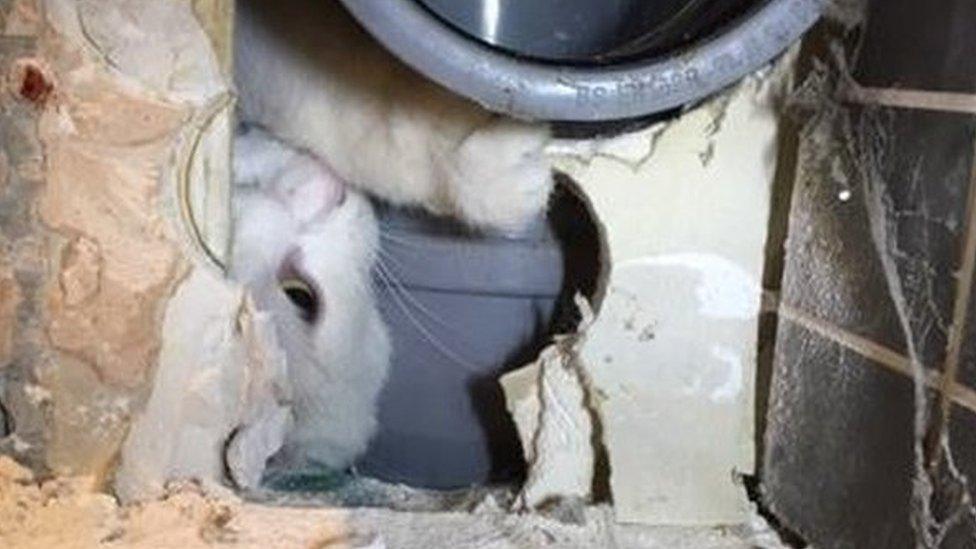The vets who treat poorly animals at Christmas
- Published
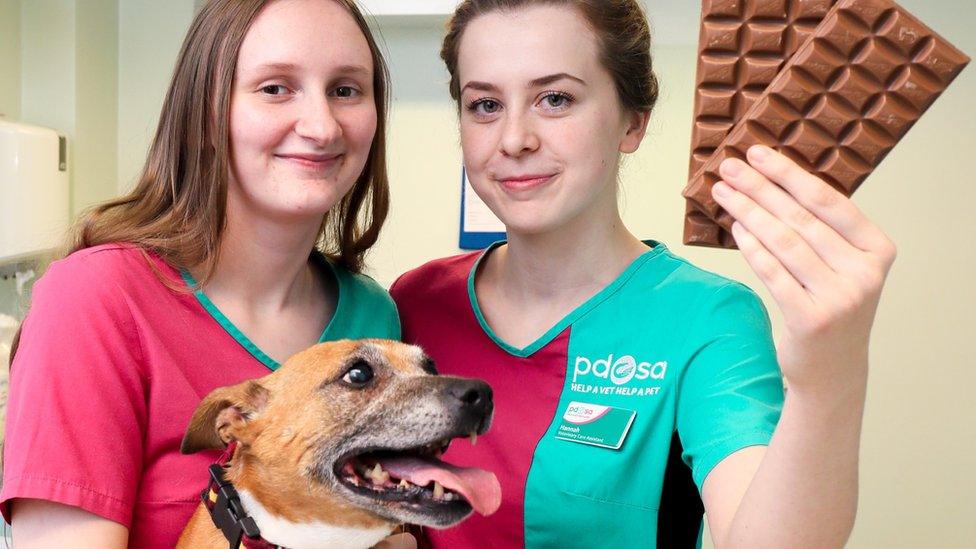
Bailey the dog, who became ill after eating chocolate, was treated by vets at the PDSA
The Christmas decorations are up, the fridge is stocked and we are nearly ready to relax and overindulge on this most wonderful time of year.
But those festive treats and knick-knacks can be harmful to our pets - with one vet saying she treats three times the number of animals in December than any other month.
BBC News spoke to the vets who treat our beloved, if slightly gluttonous, pets when things go wrong.

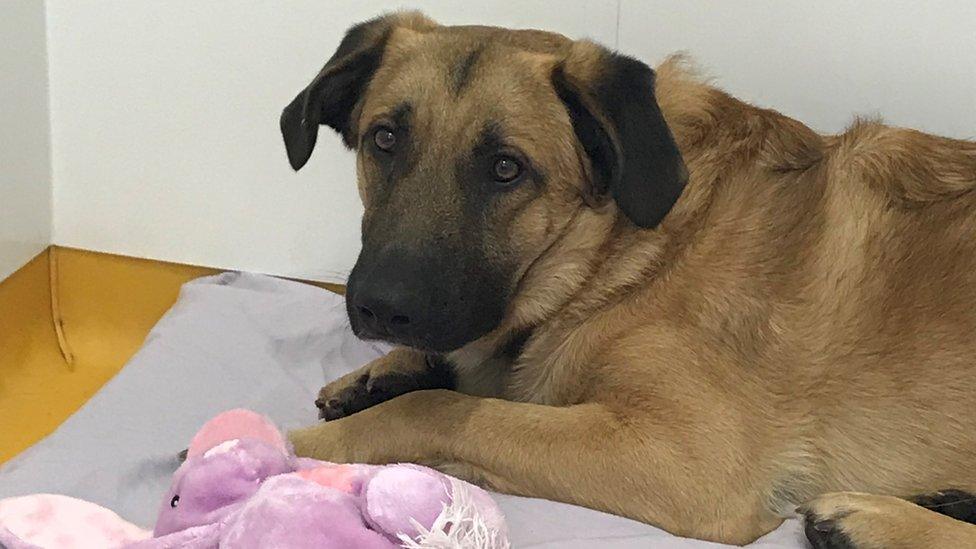
Mickey spent days in hospital after eating a mince pie
Mickey the Belgian shepherd had to spend three nights at a veterinary hospital earlier this month after munching on a mince pie he took from a plate on the sofa.
The 15-month-old was then given an injection to make him sick.
Debs Smith, from Scarsdale Vets's Pride Veterinary Centre in Derby, said Mickey was then fed meals with charcoal which "binds with any toxins left in the stomach" to prevent them absorbing into the body.
He was also put on intravenous fluids (IV) for 48 hours to keep him hydrated.
"Mickey was given IV fluids as raisins, sultanas and currants can cause kidney failure," she said.
The vet said if a dog had eaten even the smallest amount of raisins or currants, they would advise treatment.
Mrs Smith said this was typically how they treated pets who had ingested foods toxic to them.
"Unfortunately if they are not treated early it can be fatal," she said. "The earlier these things are treated the more successful."
Grapes, raisins and sultanas are known to be toxic to dogs, and the PDSA said although it was not proven they were equally dangerous to other pets such as cats, it was probably still best if they avoided them.
What your dog can't eat this Christmas
Mickey's owner Pauline Warren said: "Luckily I realised he had eaten the mince pie just a couple of minutes after and rang the vet straight away.
"I was so worried and just wanted him home, but I knew he needed treatment. I don't have any mince pies in the house now."

Another pet the practice saw this month was Jack the cockapoo, who had eaten a raisin cupcake he had snuck from the kitchen bench when his owner was not looking.
Lisa Ridley, from Twyford in Derbyshire, said: "We got him in within 40 minutes of him eating it. He had swallowed about nine raisins.
"I felt really guilty because I knew the dangers of the raisins.
"He is a very lively dog and barked most of the time [he was in hospital]. My other dog did not like him being away - she cried for most of the 48 hours he was gone."
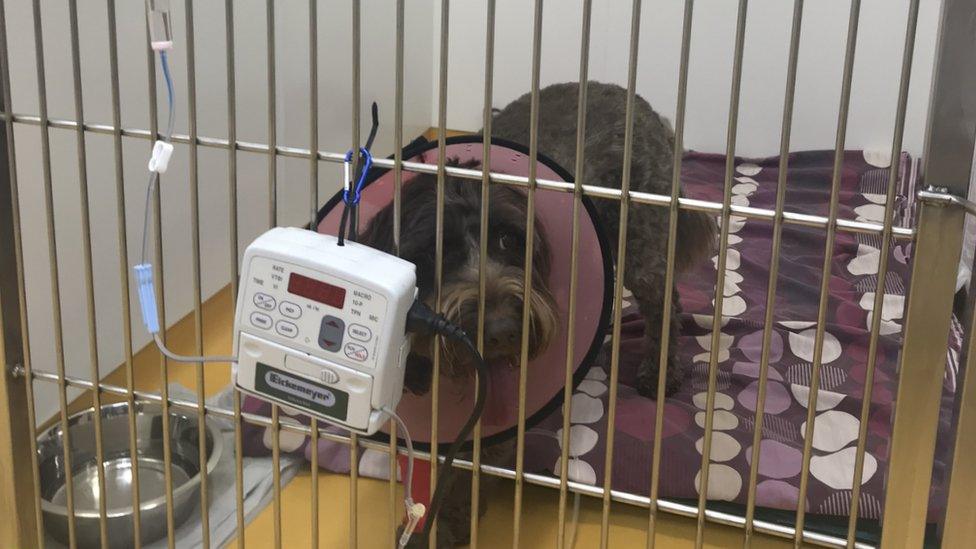
Jack the cockapoo had to stay on a drip for 48 hours after eating raisins
Pride Veterinary Centre sees about three times the number of cases in December compared with other months.
Mrs Smith advised pet owners to make sure anything harmful to animals was not left lying around.

The festive items toxic to pets
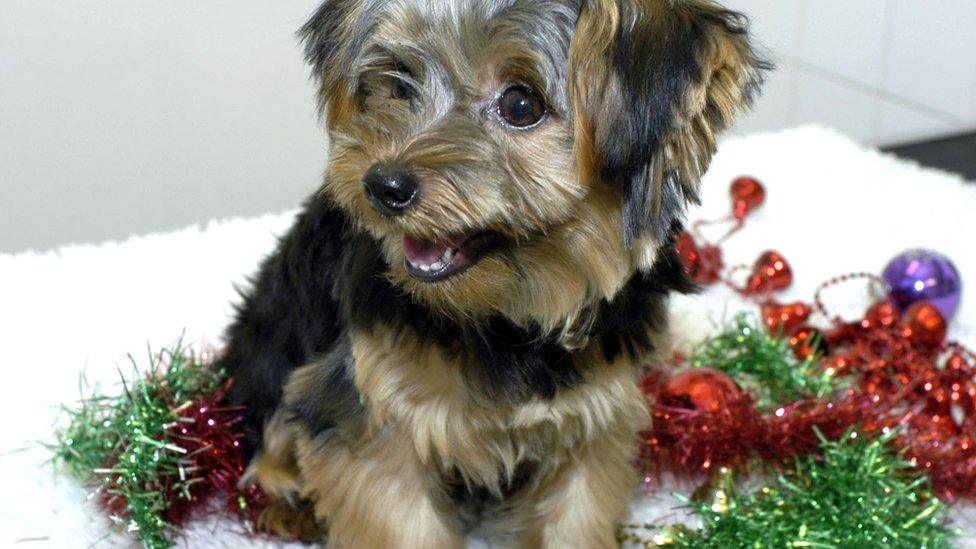
Chocolate
Anything containing raisins, sultanas and currants, such as mince pies and Christmas cake
Alcohol
Turkey, chicken or goose bones
Anti-freeze
Holly, mistletoe, poinsettia and ivy
Decorations and fairy lights
Christmas trees can be a tempting climbing frame for cats. The PDSA advises keeping them out of the room with the tree when you are not there to supervise
Source: PDSA and Pride Veterinary Centre

Ewan McNeill, from Castle Vets in Nottingham, recently had a case in which a Labrador had eaten about six or seven mince pies.
He said another common festive issue was dogs eating turkey bones and then getting them stuck - as well as dogs eating chocolate, so he advised not putting anything tempting under the tree "as dogs would be keen to investigate".
'Attitude of toddler'
He said two other common problems were cats licking or drinking anti-freeze or pets ingesting Christmas tree decorations.
The vet said anti-freeze "is quite sweet so cats seem to like it".
Mr McNeill's advice to pet owners is to take the attitude of having a toddler in the house by placing food out of reach and being careful of electrical wiring and decorations.
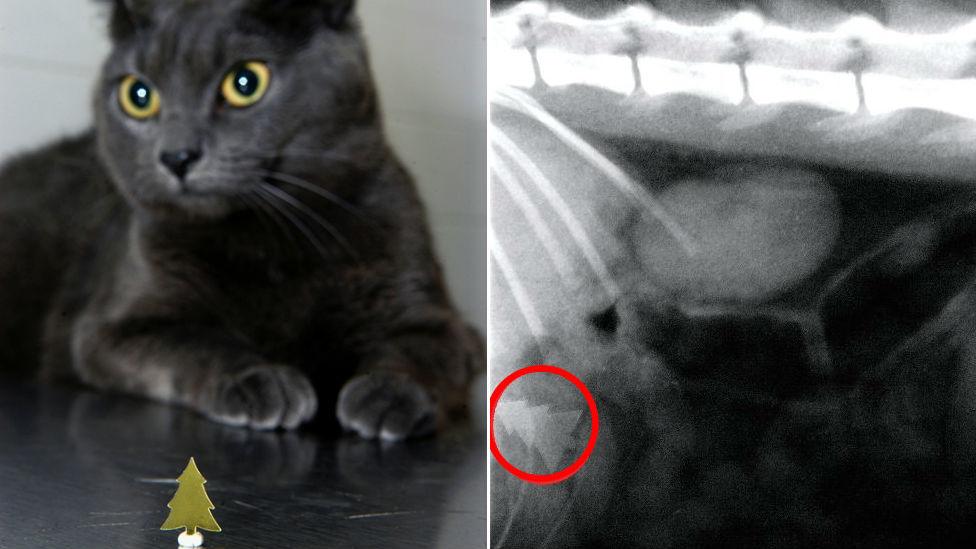
The PDSA said it once treated a cat who had swallowed a Christmas tree-shaped decoration
Animal charity PDSA said the festive cases it had seen across their pet hospitals in recent years included dogs eating chocolate, a pooch who had gobbled down fairy lights, a cat that had swallowed tinsel and another with a Christmas tree-shaped decoration stuck in its body.
Olivia Anderson-Nathan, a PDSA vet, said: "Pets have no understanding of Christmas and the excitement that it can bring.
"Routines change, decorations spring up from nowhere and an influx of noisy guests arrive without warning, making Christmas a potentially stressful time for our pets. But with a little planning, we can help our furry friends enjoy the festive period too."

Follow BBC East Midlands on Facebook, external, on Twitter, external, or on Instagram, external. Send your story ideas to eastmidsnews@bbc.co.uk, external.
- Published11 December 2018

- Published11 December 2018
